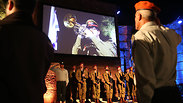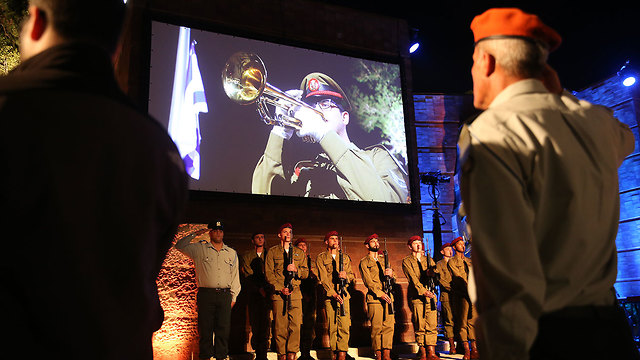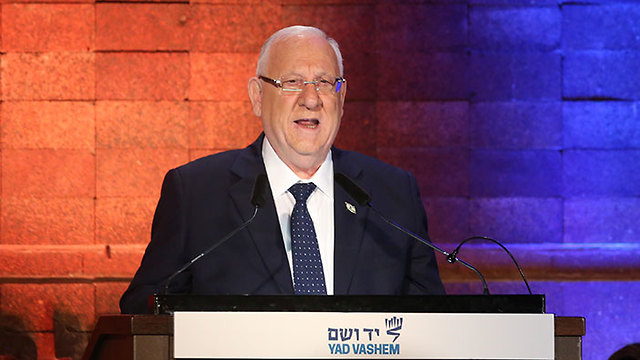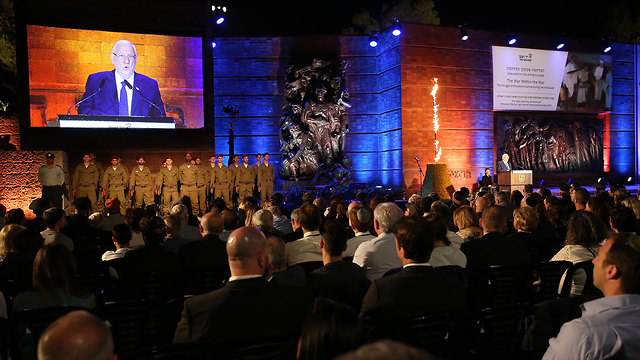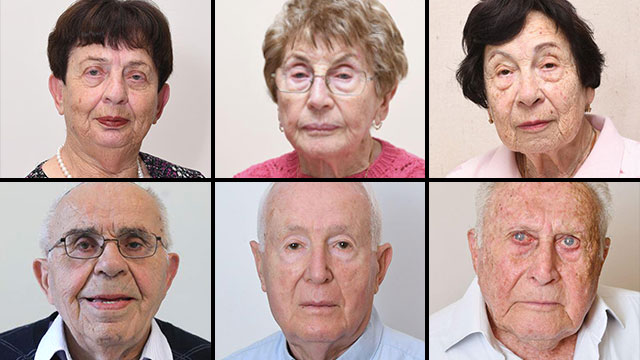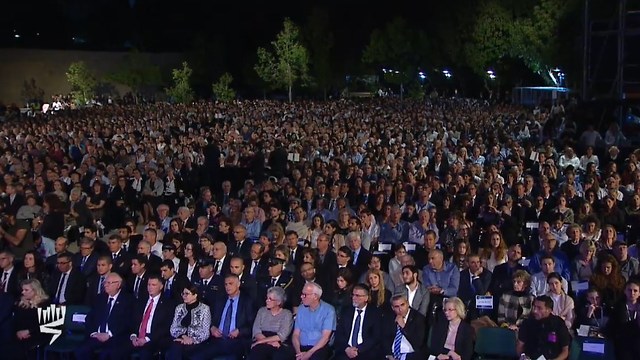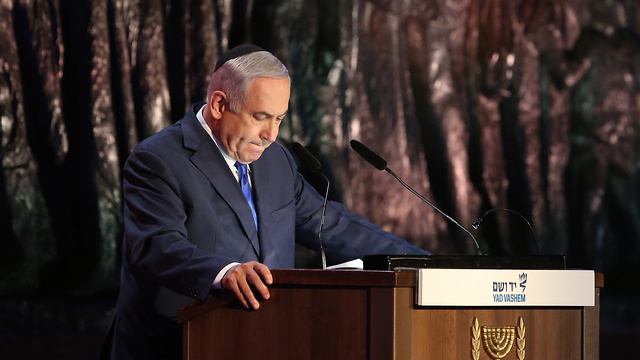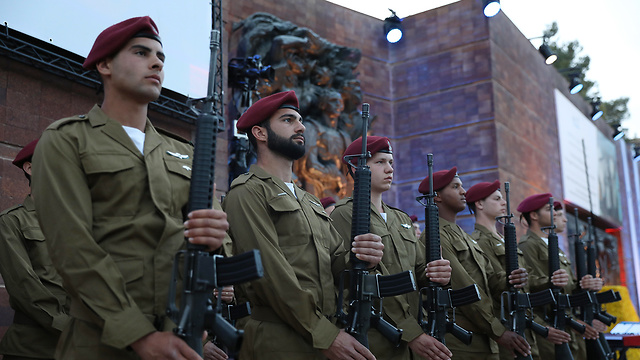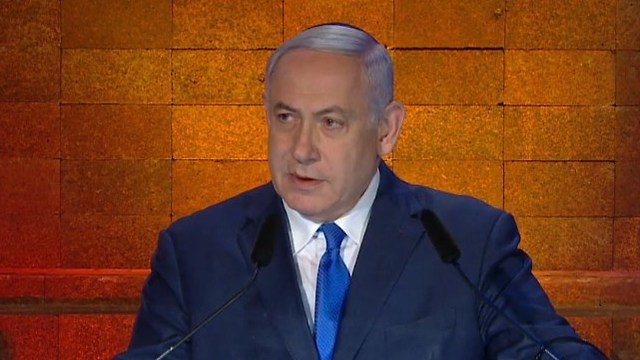
Holocaust Remembrance Day commences
Israel marking the victims and heroes of the Holocaust with a ceremony at Yad Vashem; President Rivlin warned of rising European anti-Semitism from the Right and the Left, rebukes relationship with far-Right governments; Netanyahu: extreme Right, extreme Left, radical Islam agree on 'one thing: their hatred of Jews'
President Reuven Rivlin and Prime Minister Benjamin Netanyahu delivered speeches at the central event for Holocaust and Heroism Remembrance Day at Yad Vashem Wednesday evening.
The ceremony began with the lowering of the national flag to half-mast. During the ceremony, six Holocaust survivors — Bela Eisenman, Shaul Lobovich, Fani Ben Ami, Menachem Haberman, Sara Shapiro and Yehuda Maimon — lit a flame in memory of the six million Jews murdered by the Nazis and their collaborators in World War II. A film about the survivors life stories was shown during the event as well.
The ceremony included the reading of psalms by Chief Rabbi Dovid Lau; the Sephardic Chief Rabbi Yitzhak Yosef will say the Kaddish prayer.
In his remarks, Rivlin referred to the recent increase in anti-Semitism in Europe saying: "With the end of World War Two, western Europe rebuilt itself anew as the negative (opposite) of old Europe. New Europe views itself as the lighthouse of democracy and liberalism. The European community has presented to the entire world a panorama of open borders, of cooperation, of human and civil rights.
"However, today, 80 years since the outbreak of WWII, we must look at the recent reality. Europe today, like parts of the world, is changing its face again," continued Rivlin. "Europe today, has returned to being haunted by the ghosts of the past. Perceptions of superiority, nationalistic purity, xenophobia, blatant and murky anti-Semitism, from the Left and the Right, hovering across Europe.
"It must be stressed that we are not living in the 1930's. we are not on the verge of a new Holocaust or anything similar. But we cannot ignore the new-old anti-Semitism that is again rearing its head, fueled by waves of immigration, financial crises and discontent from the political establishment. From the extreme Right and Left, anti-Semitism is permeating the heart of European leadership," Rivlin added.
Rivlin mentioned the shooting attack that occurred at Chabad of Poway, California, on the last day of Passover claiming the life of Lori Kaye, as well as anti-Semitic incidents in Britain and France.
"I do not fear for the State of Israel, the Jewish nation is no longer weak or defenseless," Rivlin added. "The State of Israel is not only a stable democracy, it is also powerful, militarily and economically." The president stressed Israel's commitment to protect the Jewish communities around the world. However, he added that some Right-wing European governments are justified in their desire to preserve their identities and view large-scale immigration with suspicion.
In an emotional ritual, six survivors lit torches in memory of the 6 million Jews murdered in the Holocaust. The torch lighters' brutal trials in concentration camps and narratives of endurance reflected this year's theme at Yad Vashem, "The War Within the War: The Struggle of the Jews to Survive During the Holocaust."
Rivlin also issued thinly veiled criticism of the Netanyahu government for fostering relationships with far-Right governments in eastern Europe: "Political powers of which anti-Semitism and racism are part of their language, heritage and spirit ought not be our partners. Whether the anti-Semitism and racism are disguised in a narrative of immigration, as on the Right, or in the narrative of human rights, as on the Left — we must uproot it wherever it is found.
"No interest or realpolitik can justify an alliance of disgrace with racist groups and elements that do not recognize their past and responsibility for the crimes of the Holocaust," Rivlin added. "If we do not know how to be clear and unequivocal, how can we demand of the nations of the world to bear responsibility and educate the youth regarding the memory of the Holocaust and its lessons."
A slew of former communist nations whose leaders recently paid their respects at Yad Vashem, such as Hungary, Lithuania and Poland, are swept up in a wave of World War II-era revisionism that seeks to diminish their culpability in the Holocaust while making heroes out of anti-Soviet nationalists involved in the mass killing of Jews. Many in Israel have accused Netanyahu of cynically betraying victims' memories for political gain.
Rivlin told the audience that he invited leaders from around the world to an international conference on combatting anti-Semitism, racism and Holocaust denial that will be held at Yad Vashem in January, 75 years since the liberation of Auschwitz,
In his remarks, Prime Minister Benjamin Netanyahu also stressed the continued threat of anti-Semitic extremism. He said that the extreme right, extreme left and radical Islam agree on "one thing: their hatred of Jews."
Netanyahu noted the deadly synagogue shootings in San Diego last weekend and Pittsburgh last October, as well as recurring vandalism at Jewish cemeteries. He also castigated a recent political cartoon in the New York Times' international edition that drew ire for playing on anti-Semitic tropes, saying that hatred of Jews has even worked its way into "respected newspapers" and mainstream views.
"We're not talking about legitimate criticism of Israel," he said, "but of systematic, poisonous and shallow hatred."
The 24-hour remembrance period began at sundown with the main ceremony at Jerusalem's Yad Vashem Holocaust memorial, held just hours after Israeli researchers reported that violent attacks against Jews rose significantly last year. This spike, highlighted by the San Diego attack, was most dramatic in western Europe.
This year's theme urges the public to keep alive memories of extraordinary Jewish courage and resilience during World War II — those who risked their lives in acts of solidarity for fellow Jews, smuggled food, organized rescue missions, published underground newspapers, played Jewish music on contraband instruments and documented their suffering for posterity.
Wednesday's event initiated one of the most melancholy holidays on the country's calendar, observed with numerous vigils, ceremonies and gatherings.
Places of entertainment and shops shutter for the evening. TV and radio stations broadcast Holocaust documentaries and interviews with survivors until sundown the next day. The names of those who perished in the genocide are read aloud in parliament.
According to the Hebrew calendar, Holocaust Remembrance Day marks the anniversary of the 1943 Warsaw Ghetto uprising — the most significant, yet doomed, act of Jewish resistance during the Holocaust that helped shape Israel's national psyche, symbolizing strength and the struggle for freedom in the face of annihilation.
On Thursday, Israel's Holocaust remembrance will stop traffic. Israelis come to a two-minute standstill to remember the dead as sirens wails across the country. Pedestrians freeze in their tracks, buses halt on busy streets and cars pull over on highways to honor the legacies of those lost.
At 11:00, the ceremony of the reading of the names of the victims will commence, followed by a ceremony at the Yizkor (Remembrance) Hall at Yad Vashem. At 14:30, the 31st the March of the Living will begin in Poland; participants will march three kilometers from Auschwitz concentration camp to the Birkenau death camp.
